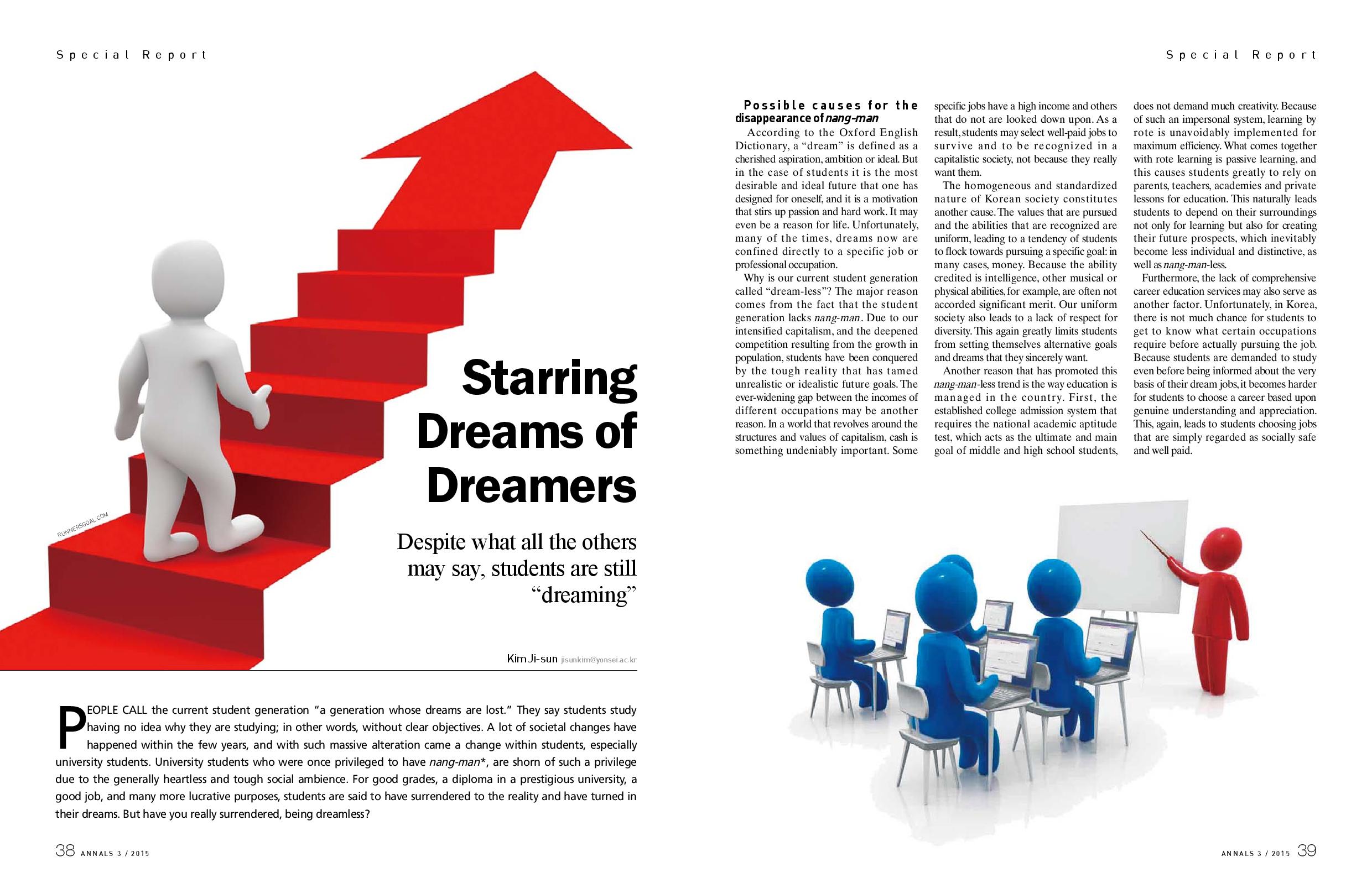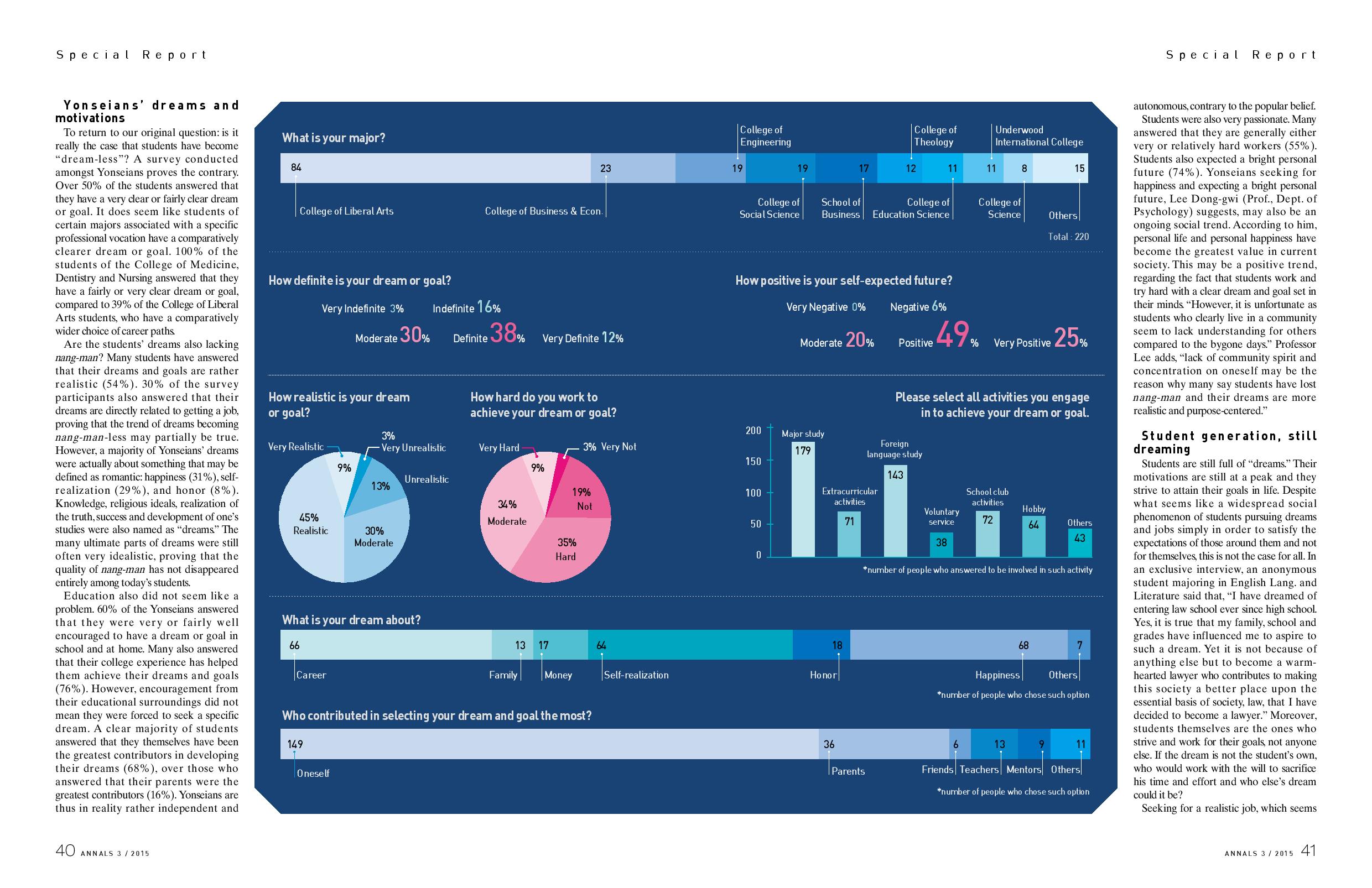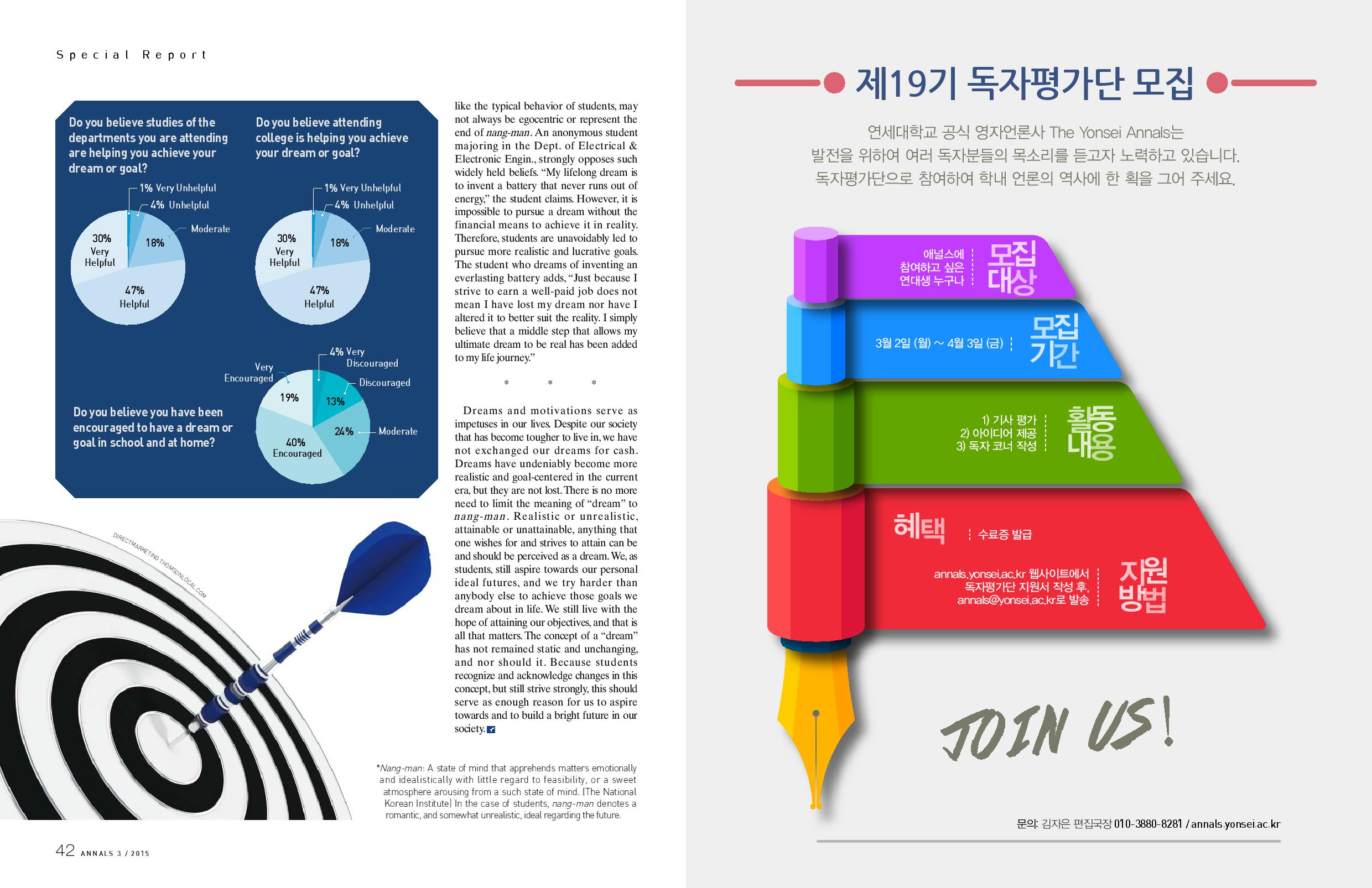PEOPLE CALL the current student generation “a generation whose dreams are lost.” They say that students study having no idea why they are studying; in other words, without clear objectives. A lot of societal changes have taken place within the last few years, and with such massive alterations came accompanying transformations in the aspirations of students, especially university students. University students, who were once privileged to have nang-man*, are shorn of this freedom due to the generally heartless and competitive social ambience. Students are said to have surrendered to the harsh economic reality and given up their dreams in exchange for good grades, a diploma from a prestigious university, a good job, and such material and quotidian goals. But have you really surrendered? Are you now dreamless?
Possible causes for the disappearance of *nang-man*
According to the Oxford English Dictionary, a “dream” is defined as a cherished aspiration, ambition or ideal. But in the case of students it is the most desirable and ideal future that one has designed for oneself, and it is a motivation that stirs up passion and hard work. It may even be a reason for life. Unfortunately, many of the times, dreams now are confined directly to a specific job or professional occupation.
Why is our current student generation called “dream-less”? The major reason comes from the fact that the student generation lacks nang-man. Due to our intensified capitalism, and the deepened competition resulting from the growth in population, students have been conquered by the tough reality that has tamed unrealistic or idealistic future goals. The ever-widening gap between the incomes of different occupations may be another reason. In a world that revolves around the structures and values of capitalism, cash is something undeniably important. Some specific jobs have a high income and others that do not are looked down upon. As a result, students may select well-paid jobs to survive and to be recognized in a capitalistic society, not because they really want them.
The homogeneous and standardized nature of Korean society constitutes another cause. The values that are pursued and the abilities that are recognized are uniform, leading to a tendency of students to flock towards pursuing a specific goal: in many cases, money. Because the ability credited is intelligence, other musical or physical abilities, for example, are often not accorded significant merit. Our uniform society also leads to a lack of respect for diversity. This again greatly limits students from setting themselves alternative goals and dreams that they sincerely want.
Another reason that has promoted this nang-man-less trend is the way education is managed in the country. First, the established college admission system that requires the national academic aptitude test, which acts as the ultimate and main goal of middle and high school students, does not demand much creativity. Because of such an impersonal system, learning by rote is unavoidably implemented for maximum efficiency. What comes together with rote learning is passive learning, and this causes students greatly to rely on parents, teachers, academies and private lessons for education. This naturally leads students to depend on their surroundings not only for learning but also for creating their future prospects, which inevitably become less individual and distinctive, as well as nang-man-less.
Furthermore, the lack of comprehensive career education services may also serve as another factor. Unfortunately, in Korea, there is not much chance for students to get to know what certain occupations require before actually pursuing the job. Because students are demanded to study even before being informed about the very basis of their dream jobs, it becomes harder for students to choose a career based upon genuine understanding and appreciation. This, again, leads to students choosing jobs that are simply regarded as socially safe and well paid.
Yonseians’ dreams and motivations
To return to our original question: is it really the case that students have become “dream-less”? A survey conducted amongst Yonseians proves the contrary. Over 50% of the students answered that they have a very clear or fairly clear dream or goal. It does seem like students of certain majors associated with a specific professional vocation have a comparatively clearer dream or goal. 100% of the students of the College of Medicine, Dentistry and Nursing answered that they have a fairly or very clear dream or goal, compared to 39% of the College of Liberal Arts students, who have a comparatively wider choice of career paths.
Are the students’ dreams also lacking nang-man? Many students have answered that their dreams and goals are rather realistic (54%). 30% of the survey participants also answered that their dreams are directly related to getting a job, proving that the trend of dreams becoming nang-man-less may partially be true. However, a majority of Yonseians’ dreams were actually about something that may be defined as romantic: happiness (31%), self-realization (29%), and honor (8%). Knowledge, religious ideals, realization of the truth, success and development of one’s studies were also named as “dreams.” The many ultimate parts of dreams were still often very idealistic, proving that the quality of *nang-man* has not disappeared entirely among today’s students.
Education also did not seem like a problem. 60% of the Yonseians answered that they were very or fairly well encouraged to have a dream or goal in school and at home. Many also answered that their college experience has helped them achieve their dreams and goals (76%). However, encouragement from their educational surroundings did not mean they were forced to seek a specific dream. A clear majority of students answered that they themselves have been the greatest contributors in developing their dreams (68%), over those who answered that their parents were the greatest contributors (16%). Yonseians are thus in reality rather independent and autonomous, contrary to the popular belief.
Students were also very passionate. Many answered that they are generally either very or relatively hard workers (55%). Students also expected a bright personal future (74%). Yonseians seeking for happiness and expecting a bright personal future, Lee Dong-gwi (Prof., Dept. of Psychology) suggests, may also be an ongoing social trend. According to him, personal life and personal happiness have become the greatest value in current society. This may be a positive trend, regarding the fact that students work and try hard with a clear dream and goal set in their minds. “However, it is unfortunate as students who clearly live in a community seem to lack understanding for others compared to the bygone days.” Professor Lee adds, “lack of community spirit and concentration on oneself may be the reason why many say students have lost *nang-man* and their dreams are more realistic and purpose-centered.”
Student generation, still dreaming
Students are still full of “dreams.” Their motivations are still at a peak and they strive to attain their goals in life. Despite what seems like a widespread social phenomenon of students pursuing dreams and jobs simply in order to satisfy the expectations of those around them and not for themselves, this is not the case for all. In an exclusive interview, an anonymous student majoring in English Lang. and Literature said that, “I have dreamed of entering law school ever since high school. Yes, it is true that my family, school and grades have influenced me to aspire to such a dream. Yet it is not because of anything else but to become a warm-hearted lawyer who contributes to making this society a better place upon the essential basis of society, law, that I have decided to become a lawyer.” Moreover, students themselves are the ones who strive and work for their goals, not anyone else. If the dream is not the student’s own, who would work with the will to sacrifice his time and effort and who else’s dream could it be?
Seeking for a realistic job, which seems like the typical behavior of students, may not always be egocentric or represent the end of *nang-man*. An anonymous student majoring in the Dept. of Electrical & Electronic Engin., strongly opposes such widely held beliefs. “My lifelong dream is to invent a battery that never runs out of energy,” the student claims. However, it is impossible to pursue a dream without the financial means to achieve it in reality. Therefore, students are unavoidably led to pursue more realistic and lucrative goals. The student who dreams of inventing an everlasting battery adds, “Just because I strive to earn a well-paid job does not mean I have lost my dream nor have I altered it to better suit the reality. I simply believe that a middle step that allows my ultimate dream to be real has been added to my life journey.”
* * *
Dreams and motivations serve as impetuses in our lives. Despite our society that has become tougher to live in, we have not exchanged our dreams for cash. Dreams have undeniably become more realistic and goal-centered in the current era, but they are not lost. There is no more need to limit the meaning of “dream” to nang-man. Realistic or unrealistic, attainable or unattainable, anything that one wishes for and strives to attain can be and should be perceived as a dream. We, as students, still aspire towards our personal ideal futures, and we try harder than anybody else to achieve those goals we dream about in life. We still live with the hope of attaining our objectives, and that is all that matters. The concept of a “dream” has not remained static and unchanging, and nor should it. Because students recognize and acknowledge changes in this concept, but still strive strongly, this should serve as enough reason for us to aspire towards and to build a bright future in our society.
*Nang-man: A state of mind that apprehends matters emotionally and idealistically with little regard to feasibility, or a sweet atmosphere arousing from a such state of mind. (The National Korean Institute) In the case of students, *nang-man* denotes a romantic, and somewhat unrealistic, ideal regarding the future.





